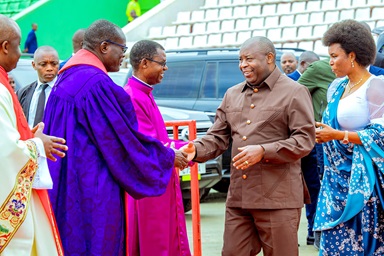
Key points:
- Church leaders said the new church is a symbol of hope for thousands of internally displaced persons living at the Nkonko camp in Congo.
- The family of a local missionary financed construction of the church, the first in the camp to be built from sustainable materials.
- The inauguration of the church was a moment of joy and celebration for returnees from Angola and the faithful of The United Methodist Church.
The atmosphere was festive in the Nkonko camp for internally displaced people as hundreds crowded around a new United Methodist church built by a local missionary couple.
United Methodist Bishop Daniel O. Lunge, who leads the Central Congo Area, dedicated Bon Samaritain United Methodist Church in July.
Intended for the 1,500 households living in the Nkonko camp, the church is a symbol of hope for the Congolese people who have returned from Angola, United Methodists in the region said. More than 10,500 internally displaced persons live in the camp.
In 2017, hundreds of thousands of Congolese fled to neighboring Angola in the wake of the Kamuina Nsapu insurgency. They were later expelled from Angola and faced serious difficulties, including lack of shelter and food, as they returned to their home country.

The United Methodist Church was one of the first organizations to assist returnees from Angola. The United Methodist Committee on Relief provided food, clothing and medical care. Lunge noted that the aid helped to convert many displaced people to United Methodism.
“Our thanks also go to our humanitarian partners at UMCOR,” Lunge said. “Thanks to them, by donating food and nonfood items, we have the faithful and a well-established local church.”
The bishop acknowledged that the camp still faces many difficulties. “I know there are still a lot of problems,” he said, “like seeing where the children must study and medical care.”
He said that the church would work to find a lasting solution.
The construction of the church in Nkonko is an additional step in The United Methodist Church's commitment to the returnees from Angola. It offers the faithful a place to gather and practice their religion. Construction of the new building was financed by the family of Paul Lokadi, a local missionary.
Subscribe to our
e-newsletter
Isaac Buatshia, a returnee from Angola who converted to Methodism, said, “I'm the happiest man today. We who were rejected and forgotten by others have found shelter and support in this church. We have eaten, carried, had food and not food. And today, we have a temple well-built of durable materials.”
Missionary Lokadi said he is pleased that the camp’s faithful now have a place to worship.
“I thank God for this palpable work,” he said. “When I saw so many people left without a temple, it hurt me so much. I do it so that I may be blessed.”
Leading the inaugural church service, Lunge expressed gratitude to Lokadi.
The church, the first in the returnee camp to be built from sustainable materials, offers people a safe and comfortable space in which to pray and worship.
“We're very happy,” said church member Eli Tshiyoyo. “It was a dream for us to have a church made of sustainable materials. We thank the Lokadi Kayongo family and The United Methodist Church for this great gesture.”
The chief of Nkonko village, Nkonko, also welcomed the construction of the church.
“In my village,” he said, “we don't have tribalism. I received them with an open heart. Unlike others, they are allowed to do whatever they want. I call on The United Methodist Church to continue with similar works.
“The United Methodist Church is a force for good in the world,” he added. “Its commitment to supporting Congolese communities is an example to follow.”
Mamu Misenga Louise also thanked the church for its support. “Yesterday we ate with UMCOR,” she said. “Today, a local couple is building us a temple. May God be praised.
“The needs are still enormous. We have no houses to sleep in, no schools, no hospitals and no water to drink from boreholes. May the church continue to remember us.”
Okandjo is a communicator for the Kasai Conference.
News contact: Julie Dwyer, News Editor, [email protected] or 615-742-5469. To read more United Methodist News, subscribe to Free Daily or Weekly Digests.



